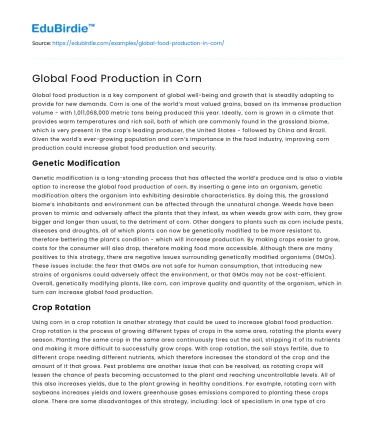Global food production is a key component of global well-being and growth that is steadily adapting to provide for new demands. Corn is one of the world’s most valued grains, based on its immense production volume - with 1,011,068,000 metric tons being produced this year. Ideally, corn is grown in a climate that provides warm temperatures and rich soil, both of which are commonly found in the grassland biome, which is very present in the crop’s leading producer, the United States - followed by China and Brazil. Given the world’s ever-growing population and corn’s importance in the food industry, improving corn production could increase global food production and security.
Genetic Modification
Genetic modification is a long-standing process that has affected the world’s produce and is also a viable option to increase the global food production of corn. By inserting a gene into an organism, genetic modification alters the organism into exhibiting desirable characteristics. By doing this, the grassland biome’s inhabitants and environment can be affected through the unnatural change. Weeds have been proven to mimic and adversely affect the plants that they infest, as when weeds grow with corn, they grow bigger and longer than usual, to the detriment of corn. Other dangers to plants such as corn include pests, diseases and droughts, all of which plants can now be genetically modified to be more resistant to, therefore bettering the plant’s condition - which will increase production. By making crops easier to grow, costs for the consumer will also drop, therefore making food more accessible. Although there are many positives to this strategy, there are negative issues surrounding genetically modified organisms (GMOs). These issues include: the fear that GMOs are not safe for human consumption, that introducing new strains of organisms could adversely affect the environment, or that GMOs may not be cost-efficient. Overall, genetically modifying plants, like corn, can improve quality and quantity of the organism, which in turn can increase global food production.
Save your time!
We can take care of your essay
- Proper editing and formatting
- Free revision, title page, and bibliography
- Flexible prices and money-back guarantee
Crop Rotation
Using corn in a crop rotation is another strategy that could be used to increase global food production. Crop rotation is the process of growing different types of crops in the same area, rotating the plants every season. Planting the same crop in the same area continuously tires out the soil, stripping it of its nutrients and making it more difficult to successfully grow crops. With crop rotation, the soil stays fertile, due to different crops needing different nutrients, which therefore increases the standard of the crop and the amount of it that grows. Pest problems are another issue that can be resolved, as rotating crops will lessen the chance of pests becoming accustomed to the plant and reaching uncontrollable levels. All of this also increases yields, due to the plant growing in healthy conditions. For example, rotating corn with soybeans increases yields and lowers greenhouse gases emissions compared to planting these crops alone. There are some disadvantages of this strategy, including: lack of specialism in one type of crop, the skill and knowledge it requires and cost of proper machinery. In the end, crop rotation has many benefits that can increase corn yields, which therefore can increase global production.
No Till Farming
No till farming is a strategy that corn farmers use to maximize yields, and could result in the increase of global food production. Soil tilling is a substantial reason for soil degradation, so through sustaining the grassland biome, in no till farming, seeds are planting directly into untilled soil, which still contains past crops’ remains. This method relates to increasing global food production in many ways. The soil remains healthy and sustained, which means that farms can live on for longer, consistently providing produce for consumers. Less soil moisture is lost through no till farming, as plant residue is left behind, which helps hold the moisture in the soil and protect against evaporation - all of which improves quality and success of the plant. Using no till farming with corn is increasing in popularity with farmers, as these practices produce higher yields compared to others. There are negatives surrounding this strategy, like: initial costs of machinery, risk of fungal disease due to the increased moisture in the soil and the use of more herbicides to combat weed disruption. Overall, no till corn farming reaps many benefits that can result in an increase in global food production.
Conclusion
In conclusion, an increase in global food production - specifically in staple foods like corn - is necessary due to our evolving and growing world. There are many strategies that could help with this, including: genetically modified organisms, crop rotation and no till farming. Corn is the most produced grain in the world, so it is vital that useful strategies are put in place to sustain its growth and feed the world.






 Stuck on your essay?
Stuck on your essay?

